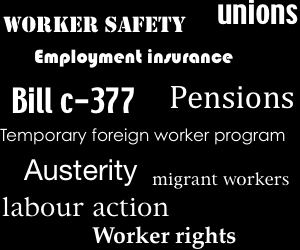Up to 1,000 killed in yet another Bangladeshi sweatshop disaster
A breathtaking body count of up to 1,000 is the expected result of Bangladesh’s latest garment factory disaster, this time a collapsed building. While that number of fatalities would be unprecedented — making it the worst industrial accident in the country’s history — such “accidents” are par for the course in Bangladesh’s decrepit garment factories that pump out products for Western retailers from JC Penney to Wal-Mart.
Just last week, Wal-Mart and Sears came under fire for declining to join other international buyers in offering compensation to victims of a Bangladeshi factory fire that killed hundreds last fall.
Meanwhile, the AFL-CIO released a report this week that sharply criticizes industry-financed workplace audit schemes for making what the report says are false claims of safety and fair treatment of workers at factories across the globe.
EI protests to kick off week of action for workers’ rights
Workers advocate groups across are planning protests against the Harper government’s reforms to the employment insurance system this Saturday, including a mass rally in Montreal and demonstrations outside several MPs’ offices across the country.
The same day marks the beginning of a national Week of Action for Workers’ Rights declared by the Common Causes coalition.
Ruling on Charter right to strike overturned by Saskatchewan Court of Appeal
The Saskatchewan Court of Appeal has overturned a lower court ruling that found the province’s essential services legislation unconstitutional on the grounds that the right to strike is protected by the Canadian Charter of Rights and Freedoms.
The case is likely to be appealed to the Supreme Court of Canada.
As day of mourning nears, Labrador mine operator charged in another death
Sunday April 28 will mark the International Day of Mourning for workers killed, injured or made ill on the job. An estimated 1,000 Canadians die each year on the job or from workplace-related illness.
The Iron Ore Company of Canada was charged this week with six violations of health and safety rules leading to one such death. The worker was electrocuted while installing a power line at the company’s Labrador City mine in 2011. The same company pled guilty four months ago to charges in connection with another worker death in 2010.
In other workplace safety news, Ontario is considering updating its rules on the handling of toxic materials in workplaces like demolition and construction sites, while Saskatchewan has just passed a law requiring all public-sector building owners to report whether their buildings contain asbestos. That’s not yet required in any other province.
Lockout for Ontario steel workers
U.S. Steel Corp has given notice to 900 workers at its Nanticoke, Ontario mill of a lockout starting this Sunday. The workers voted earlier this week to reject the company’s final contract offer.
This will be the third lockout by U.S. Steel since it took over operations of Stelco Inc. In 2007.
Other headlines of note
West Fertilizer explosion in Texas puts spotlight on worker safety
The global shortage in health workers is at crisis point
Crowley’s red hot labour market
How the Conservatives built the temporary worker pipeline, and why you should care
Why BC’s Lower-wage Workers Are Struggling
CUPE official backs pension reforms despite protests
RBC listens to unions after they threaten to pull $1 billion for outsourcing work
Mysterious 2011 review of Labour Code explained — corporate influence, of course!
The province’s shrewd but savage strategy to stick it to Ontario’s teachers



